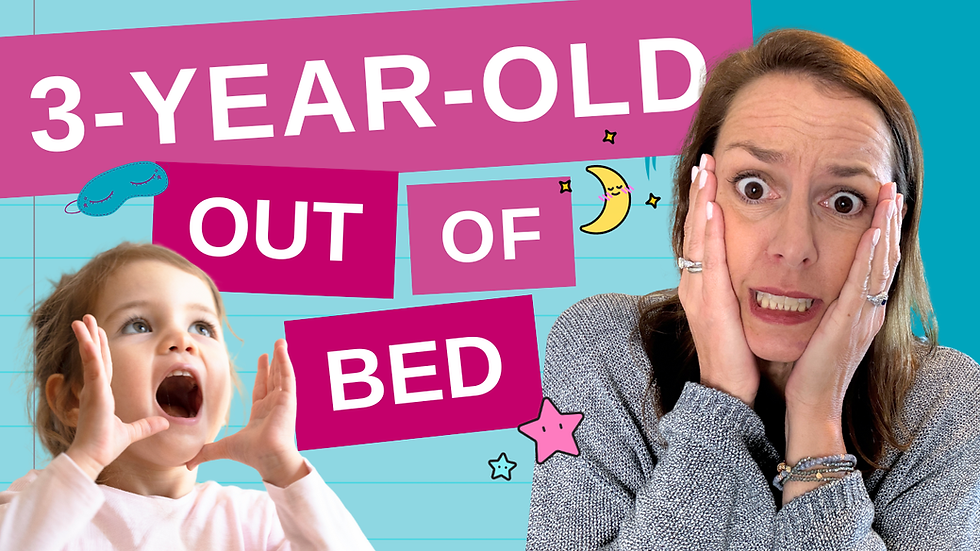Spring Forward: How To Sleep Train a Toddler During Time Change
- Jessica Berk

- Mar 4, 2024
- 3 min read
It feels like we were just here, trying to figure out this whole time change thing, right?
But here we are again! The time is changing on March 10th, 2024 so this time, we’re springing forward. This time change isn’t typically as disruptive as the fall time change, but there are still some easy things you can do to keep your kids’ sleep from falling apart.
>>Watch this blog on my Awesome Little Sleepers YouTube channel! 👇
Get ready to spring forward with a few simple tips
I always like this time change because it means that the sun will be out later and spring is coming. Living in the northeast where it’s been cold and dark for the last few months, I’m ready for it!
On the other hand, the time change is also a little stressful because it can throw our kids’ sleep schedules out of whack. Good news: we can easily prepare for this so it’s not a huge disruption.
Overnight on Saturday, March 9th, most of the US is going to spring forward, meaning we’re going to lose an hour of sleep. At 2 a.m. on Sunday, March 10th, the time will magically become 3 a.m.
Now, losing an hour of sleep isn’t cool, especially because most people are already not getting enough sleep in the first place! In fact, studies have shown that after Daylight Savings Time starts in March, there is an uptick in heart problems, mood disorders, and motor vehicle accidents just from a collective loss of 1 hour of sleep.
So, that’s a warning for you parents, too: go to bed early!
We prepare our kids for the time change by doing just that, and it’s what I call “hopping back” bedtime.
How to start “hopping back” bedtime
To hop back bedtime, we’ll use a gradual adjustment strategy just like we do in the fall, but in the opposite way. We’re going to move bedtime EARLIER in the days leading up to the time change.
For kids 2 to 5 years old, I recommend starting this process 3 days before the time change and making adjustments in 20-minute increments. This means moving bedtime (and naptime) earlier by 20 minutes per day.
Here’s an example using 7 pm as bedtime for a 3-year-old:
On Thursday, March 7th, move bedtime 20 minutes earlier to 6:40 pm.
On Friday, March 8th, move another 20 minutes earlier to 6:20 pm.
On Saturday, March 9th, move the last 20 minutes earlier to 6 pm.
Then, on Sunday night after the time has sprung forward and the clock says 7 pm, it will feel like 6 pm in your toddler’s body, which is the bedtime you have adjusted them to.
If your child is over 5 years old, you can start on Friday and make the change to bedtime in 30-minute chunks. So, Friday bedtime would be 6:30 pm and Saturday bedtime would be 6 pm.
Even if you don’t adjust bedtime an entire hour earlier in advance, just splitting the difference and moving it 30-minutes earlier on Saturday night will help. You just don’t want your child staying up too late on Sunday and getting overtired. Overtiredness is the culprit behind so many of our kids’ sleep problems.

Three things to keep in mind to ease into spring forward
Be Realistic
The younger the child, the more difficult the time change can be for them. Once your child has well-established, good sleep habits, they’re able to tolerate change more easily. Having a solid foundation of good sleep habits is the key to breezing through time changes easily. Once your child’s body builds up that muscle memory - that need for sleep - sleep schedules aren’t as fragile and can’t be thrown off as easily.
If you need help establishing this baseline of good sleep habits and establishing a consistent bedtime, check out my free Toddler Sleep Masterclass. You can save your spot in the class at TodderSleepMasterclass.com
Stick to the Clock
Once the time changes on Sunday, stick to the clock. Try to stick as close to the “old” schedule as possible. If your child typically gets up for the day at 6:30 am, don’t let them start the day earlier once the time changes. If normal bedtime is 7:00 pm, it should be 7:00 pm on Sunday night. Don’t let your child stay up later just because the clock is different.
Be Patient
It’ll take everyone a few days for their bodies to fully adjust. So be patient, stick with the plan for gradual adjustment leading up to the change, and then stick with the clock after. It will happen!
If you need help establishing great sleep habits, let me help you. I’ve got so many great resources.
For more details on the magic of the early bedtime, I’ve put together a free resource for you. Visit THIS LINK to download your copy.
.png)




Such a helpful post! You explained the spring time change in a way that feels supportive rather than overwhelming, and the step-by-step bedtime shift tips are exactly what many parents need. It’s refreshing to find advice that feels grounded in real family experience. I recently read a samedayiplomas review blog https://samedaydiplomas.com/ that also highlighted how breaking down tricky topics can make them feel manageable, so your approach here really resonated with me. Thanks for sharing!